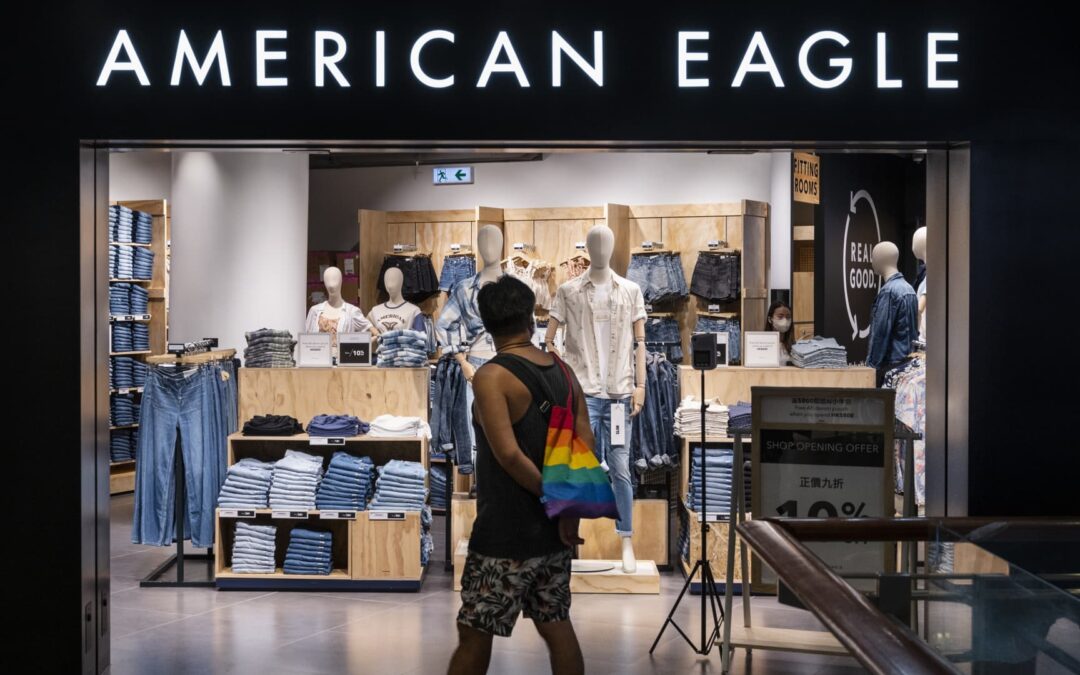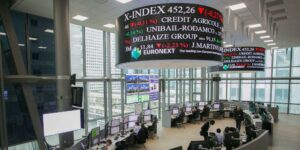A shopper walks past the American clothing and accessories retailer American Eagle store in Hong Kong.
Budrul Chukrut | Lightrocket | Getty Images
American Eagle missed Wall Street’s sales targets for a second quarter in a row on Thursday, but profits grew by nearly 60% thanks in part to lower product costs.
Shares fell more than 5% in premarket trading Thursday.
Here’s how the apparel company did in its second fiscal quarter compared with what Wall Street was anticipating, based on a survey of analysts by LSEG:
- Earnings per share: 39 cents vs. 38 cents expected
- Revenue: $1.29 billion vs. $1.31 billion expected
The company’s reported net income for the three-month period that ended Aug. 3 was $77.3 million, or 39 cents per share, compared with $48.6 million, or 25 cents per share, a year earlier.
Sales rose to $1.29 billion, up about 8% from $1.2 billion a year earlier. That sales gain would have been slimmer had it not been for a calendar shift, which positively impacted second-quarter sales by $55 million.
During the quarter, American Eagle’s intimates line Aerie saw revenue grow 9% while its namesake brand grew by 8%.
American Eagle’s gross margin came in at 38.6% — 0.9 percentage points higher than the prior year and in line with what analysts had expected. The gross margin expansion was led by “favorable product costs,” indicating American Eagle spent less to make its assortment during the quarter. It’s unclear if it lowered prices as a result.
The longtime mall brand issued a better-than-expected outlook for the current quarter but its forecast was lower than anticipated for the full year, indicating the company is still bracing for a turbulent second half.
For the current quarter, American Eagle expects comparable sales to grow between 3% and 4%, which is better than the 2.8% growth that analysts had expected the company to forecast, according to StreetAccount.
The retailer is expecting total revenue to be flat to up slightly for the third quarter — in line with expectations, according to LSEG.
For the year, the company expects comparable sales to increase approximately 4%, with total revenue up 2% to 3%, shy of what analysts had expected. Wall Street was expecting its full-year comparable sales forecast to be up 4.2% and overall sales to be up 3.5%, according to StreetAccount and LSEG.
In May, Finance Chief Mike Mathias told CNBC that American Eagle is maintaining a “cautious” view for the back half of the year as it awaits interest rate decisions from the Federal Reserve and prepares for “noise” around the upcoming presidential election.
Like other retailers contending with slowing demand for discretionary items, American Eagle has looked to cut costs and boost efficiencies so it can protect profits, even if sales are sluggish. Earlier this year, it unveiled a new strategy to grow profits and is working to boost sales by 3% to 5% each year over the next three years and get its operating margin to about 10%.
During the quarter, American Eagle made some strides in achieving that goal. It posted an operating income of $101 million, an increase of 55%, while its operating margin grew 2.4 percentage points to 7.8%. Operating income would have been lower had it not been for the calendar shift, which positively impacted the metric by $20 million.









